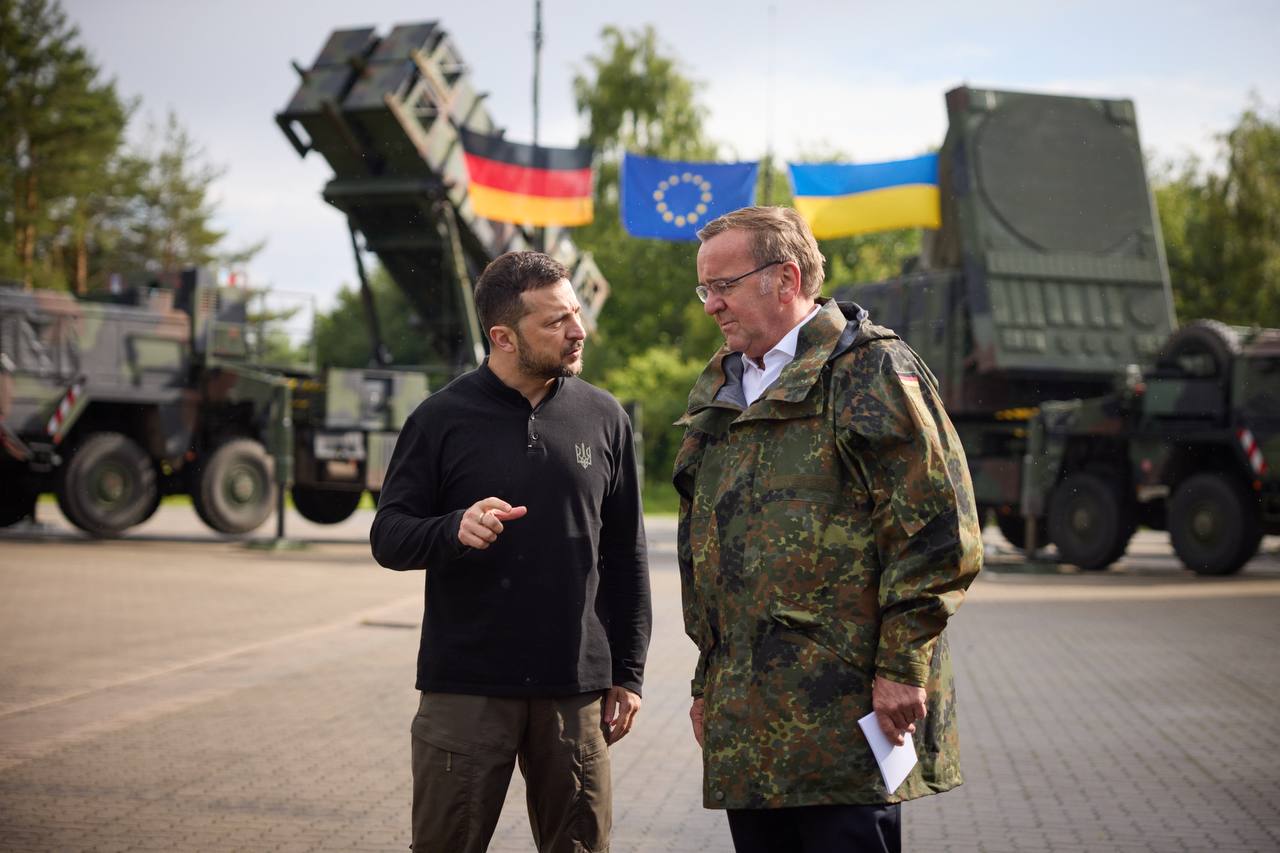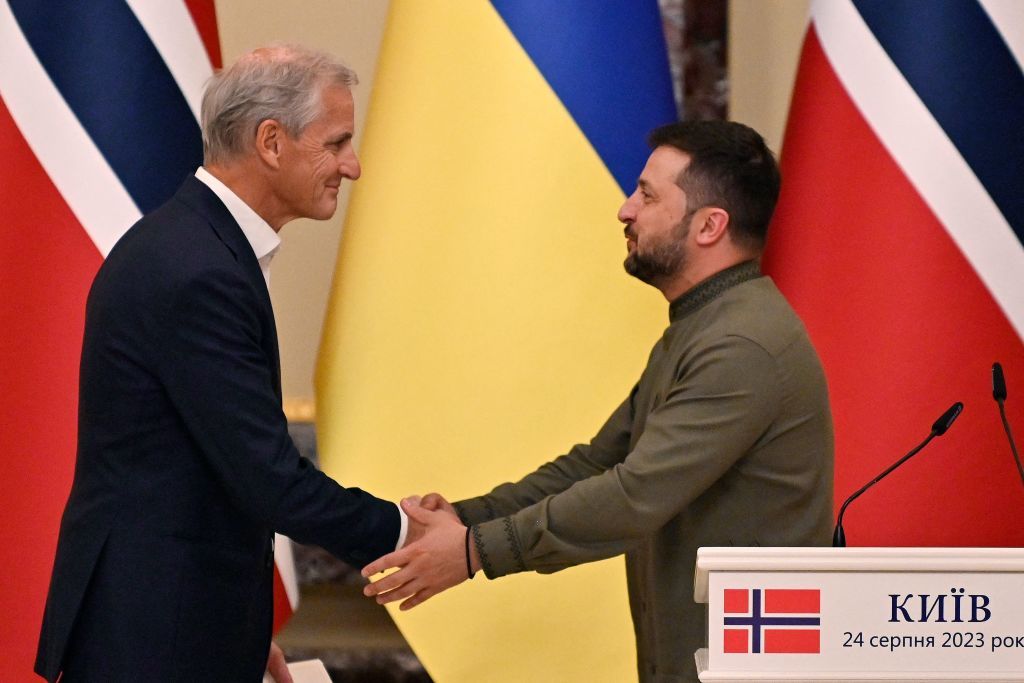Ukraine war latest: Ukraine destroys Russian air defense radars in occupied Crimea, military says

Key developments on June 12:
- Ukraine destroyed Russian S-300, S-400 systems' radars in occupied Crimea, military says
- Netherlands to provide its first F-16s to Ukraine in summer, Dutch minister says
- Military intelligence confirms 2 Russian Su-57 aircraft hit in recent strike
- At least 9 dead, 29 injured in Russian missile strike on Kryvyi Rih
- Rheinmetall, Kyiv agree to start producing Lynx armored vehicles in Ukraine in 2024
- Police find evidence of Russian cluster munitions in Kyiv Oblast
Ukrainian forces destroyed two radars of S-300 and S-400 air defense systems in several areas in occupied Crimea overnight on June 12, Ukraine's General Staff reported.
Explosions were reported in multiple towns across the peninsula, as well as in Russia's Krasnodar Krai at night.
One Russian S-300 anti-aircraft missile system near the Russian Belbek military airfield and two S-400 anti-aircraft missile systems near Belbek and occupied Sevastopol came under Ukraine's missile strike, the military said.
Information on the scale of damage to the third radar is being specified, according to the General Staff.
"In addition, further detonations of ammunition were spotted in all three areas where Russian anti-aircraft missile divisions were deployed," the military said.
The General Staff did not provide further details on the consequences of the attack or what weaponry was used.
The Russian-installed proxy head of Sevastopol, Mikhail Razvozhayev, claimed that there was no damage or casualties as a result of the attack.
This appears to be the second attack on Russia's air defenses in Crimea in a week. Ukraine reportedly hit one S-400 anti-aircraft missile unit near Dzhankoi, and two more S-300 anti-aircraft missile units were attacked near occupied Chornomorske and Yevpatoria overnight on June 10.
Ukraine has carried out a number of successful attacks against Russian targets in Crimea and its vicinity, heavily degrading the Russian Black Sea Fleet.
Netherlands to provide its first F-16s to Ukraine in summer, Dutch minister says
The Netherlands will deliver its first F-16 fighter jets to Ukraine already this summer, shortly after Denmark, Dutch Defense Minister Kajsa Ollongren said in an interview with European Pravda published on June 12.
The minister presented a more pessimistic timeframe in May when she said that the first Dutch F-16s would start flowing to Ukraine only in autumn.
The Netherlands has pledged to deliver 24 of its fourth-generation U.S.-made jets to Ukraine as Kyiv seeks to bolster its Air Force, in addition to F-16s promised by Denmark, Belgium, and Norway.
As Ollongren explained, the joint plan evinsages Denmark supplying its aircraft first and the Netherlands starting its continuous deliveries right afterward, as early as this summer. She did not provide a more specific timeframe.
The minister said that everything is "moving according to plan" regarding the preparation of Ukrainian infrastructure and technical personnel needed to operate the aircraft.
Ollongren reiterated her country's position that Ukraine will be able to use Dutch-supplied F-16s "to target military targets – when necessary for self-defense – that are on the other side of the border" with Russia.
In turn, Belgium previously said that its F-16s may be used by Ukraine only within Ukrainian territory.
According to Politico, Kyiv is growing frustrated with the slow pace of training Ukrainian pilots in the U.S. and elsewhere, which threatens to further delay the supply of F-16s.
Ollongren also added during the interview that this was her last visit to Ukraine as the Dutch defense minister, a position she held in Mark Rutte's decisively pro-Kyiv cabinet since January 2022.
The largest party in the incoming coalition government is the far-right Party for Freedom (PVV), which has often been critical of the support for Ukraine. The leaders of the new coalition issued a statement in May where they pledged to maintain their support for Kyiv.
Military intelligence confirms 2 Russian Su-57 aircraft hit in recent strike
Ukraine's military intelligence (HUR) can confirm that two of the Russian Su-57 fighter jets were hit during a strike on the Akhtubinsk airfield in Astrakhan Oblast, but one of them suffered only light damage, the agency's spokesperson, Andrii Yusov, said on air on June 12.
"We can now say that one Su-57 suffered significant damage, and the other one suffered lighter damage and may be possible to restore," Yusov said.
The military intelligence agency reported on the attack on June 9, marking the first hit against this model of aircraft. The Su-57 is Russia's most modern fighter jet, with only a few units in service in the Russian Air Force.
Satellite imagery published after the attack seemed to have confirmed a successful strike against the Akhtubinsk airfield in southern Russia, lying around 590 kilometers (over 360 miles) from the front line.
Already on June 10, Yusov said that according to preliminary information, two Su-57s may have been hit.
Military intelligence does not usually claim public responsibility for attacks on Russian territory, but sources told the Kyiv Independent that Ukraine has carried out a number of long-range strikes against military and industrial targets deep inside the Russian borders.
At least 9 dead, 29 injured in Russian missile strike on Kryvyi Rih
A Russian missile struck a residential area in the central-eastern Ukrainian city of Kryvyi Rih in Dnipropetrovsk Oblast, killing at least nine people and injuring 29 others, the authorities reported on June 12.
According to Ukraine's Prosecutor General’s Office, five of the injured are children.
"The police are documenting another Russian war crime," Interior Minister Ihor Klymenko said in a post on Telegram.
An explosion was initially reported in the city by Kryvyi Rih mayor Oleksandr Vilkul at 3:51 p.m. local time.
Soon after, Dnipropetrovsk Oblast Governor Serhii Lysak reported that a missile had struck a residential area in the city.
The attack comes just a few hours after Russian forces launched a mass missile attack overnight on June 12, targeting multiple Ukrainian regions.
Ukrainian defenses downed all the 24 Shahed-type drones launched by Russia, as well as one Kinzhal Kh-47M2 air-launched ballistic missile and four Kh-101/555 cruise missiles over Kyiv, Dnipropetrovsk, Zaporizhzhia, Poltava, Kharkiv, and Vinnytsia oblasts, the Air Force said.
Eleven of the Shahed-type drones were shot down in Dnipropetrovsk Oblast, where the attacks resulted in damage and injured two people: a 39-year-old man and a 40-year-old woman. Their 13-year-old son suffered shock, Lysak said.
Russia also reportedly launched an Iskander-M ballistic missile, but the Air Force did not report that it was intercepted.
Rheinmetall, Kyiv agree to start producing Lynx armored vehicles in Ukraine in 2024
The German arms company Rheinmetall and the Ukrainian government agreed on the sidelines of the Ukraine Recovery Conference in Berlin to begin production of the modern Lynx armored vehicles in Ukraine this year, officials confirmed to the media on June 12.
"The first such vehicle will be produced in Ukraine by the end of the year," Strategic Industries Minister Alexander Kamyshin told Ukrinform in Berlin.
The news comes shortly after Rheinmetall opened its first plant in Ukraine. The factory will repair and later also produce armored vehicles jointly with the Ukrainian state-owned enterprise Ukroboronprom.
Its opening is part of Kyiv's efforts to localize arms production and develop a more independent arms industry.
The location of the plant was not disclosed due to security reasons.
Last December, Rheinmetall announced its plans to start producing Fuchs armored personnel carriers in Ukraine by late summer of 2024 and Lynx vehicles by late 2024, or "12 to 13 months" after signing the contract.
Rheinmetall's Lynx was first presented in 2016. It has a modular design, meaning it can be equipped with different armaments and function as an infantry fighting vehicle, an anti-aircraft platform with a 30-35 mm weapon, or even to operate a 120 mm cannon of the Leopard tank.
Apart from Ukraine, the Hungarian government also signed a contract for 218 Lynx vehicles in 2020.
Rheinmetall provides weapons and equipment to Ukraine under contracts with the German government, such as Leopard 1 tanks, mortar shells, and drone surveillance systems. The company previously said it plans to open at least four production plants in Ukraine.
Police find evidence of Russian cluster munitions in Kyiv Oblast
Cluster munitions have been found at the site of a Russian missile attack in Kyiv Oblast, the region's police reported on June 12.
Kyiv and the surrounding region came under a Russian drone and missile attack in the early hours of June 12. There were no reports of casualties, but falling debris from intercepted missiles caused damage in Kyiv Oblast.
While documenting the impact of the attack on the morning of June 12, "law enforcement officers discovered fragments of dangerous cluster submunitions," the Kyiv Oblast Police said.
"Explosive objects pose a threat to human life and health and can detonate at the slightest movement," the police warned, advising civilians to refrain from visiting the site of an attack.
"Specialists are conducting an inspection and research for the presence of similar fragments," the police said.
Russia attacked Odesa on April 29 with an Iskander missile armed with a cluster munition warhead, killing at least five people and injuring around 30, including children.
Ukrainian officials have repeatedly accused Russia of using cluster munitions to target civilian areas. These weapons "spray" small bomblets across a wide area, with some of them detonating long after the attack, posing a continued danger to the local population.

















